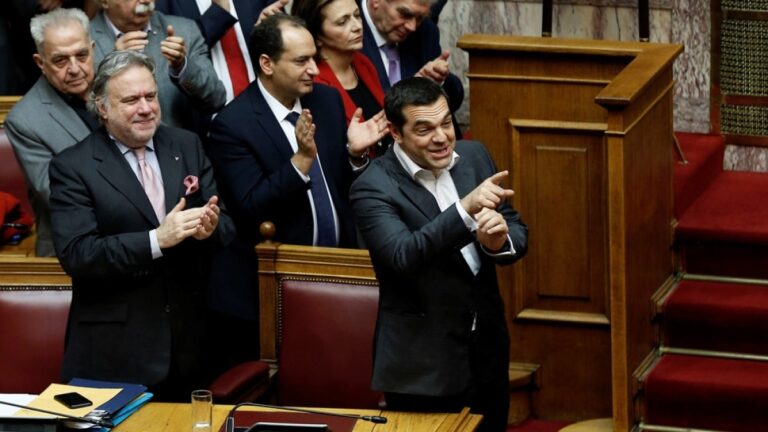Amid deep divisions, Greek parliament approves deal to change Macedonia’s name to end protracted conflict between neighbors.
After decades of claims, counterclaims and, at times, odious politics, Athens and Skopje have resolved one of Europe’s most intractable conflicts.
A long and heated debate in Greece’s 300-seat parliament ended Friday with a majority of 153 MPs voting in favor of a deal to end the long-running conflict between the two neighbors by renaming the former Yugoslav Republic of Macedonia like the Republic of North Macedonia. In total, 146 MPs voted against the agreement and one abstained.
“Today is a historic day. Greece is protecting an important part of its history, the heritage of ancient Greek Macedonia,” Greek Prime Minister Alexis Tsipras said on Twitter after a bruising process that saw his ruling coalition ally resign at the beginning of the month.
Macedonian Prime Minister Zoran Zaev congratulated Tsipras and hailed the result as a “historic victory.”
Congratulations my friend @tsipras_eu, together with our peoples, we have won a historic victory. Long live the Prespa agreement! For eternal peace and progress in the Balkans and Europe! pic.twitter.com/f9aIpMa4Xz
– Zoran Zaev (@Zoran_Zaev) January 25, 2019
According to the controversial Prespes Agreement, signed in June last yearthe small Balkan country will now be internationally recognized as North Macedonia in exchange for Greece unlock your way to NATO and membership of the European Union. Its language will be recognized as “Macedonian” and its citizens as “Macedonians/citizens of the Republic of North Macedonia”.
The vote in Athens, which took place almost two weeks after Skopje MPs narrowly approved the name change, ends a 27-year conflict between the two countries.
However, the societies of the two countries remain polarized.
In Athens, thousands of people waving flags and chanting “traitors” gathered Thursday evening in front of the Greek parliament building to protest the deal.
Similar protests took place in other parts of the country, mainly in northern cities where opposition to the deal is stronger, according to polls. showing six out of ten Greeks reject the agreement.
Athens has long opposed the use of the name Macedonia for its neighbor, which declared independence in 1991 following the breakup of the former Yugoslavia, saying it implied a territorial claim. on the Greek province of the same name as well as an appropriation of Greek cultural heritage. Skopje has denied the allegations.
“Some Greeks oppose the agreement because they believe that the term Macedonia historically belongs to the Greeks. Therefore, the use of the word ‘Macedonia’ by our northern neighbor amounts to a historic theft committed against ‘Greekness’,” said Dimitris Christopoulos, professor of political science at Panteion University in Athens.
In Skopje, opponents of the agreement have also taken to the streets in recent months.
Trajko Slaveski, former finance minister and current member of the opposition VMRO-DPMNE party, called the deal a defeat for his country.
“The agreement represents a pure capitulation to the irresponsible demands of a neighboring country, both a member of NATO and the EU, and as such cannot be supported,” Slaveski told Al Jazeera.
For Slaveski, it is not only a question of legitimacy but also of heritage and identity.
“The name of the country and, more importantly, the identity, culture and history of its people have been changed under immense pressure, with numerous violations of our constitution and respectful laws. This undermines the very foundations of our country and our society, with serious consequences for our future,” he argued.
Others, however, believe that the agreement will have positive implications for both countries, both regionally and Europeanly.
“The agreement shows that the carrots and sticks of the European process work and that the EU can function as a peace project, while reaffirming the presence of NATO and the EU in the region”, Nikos Skoutaris, senior lecturer in European law at the University of East Anglia, said.
The agreement will also allow greater cooperation in many areas, including in handling the refugee crisis and in promoting better economic relations, according to Gjorgji Filipov, a diplomat in Skopje.
“Macedonia and Greece gain and lose something, but in the end it is for the good of both sides,” he said.


